Week-to-Week: The MM Hockey Romance Revolution will be Televised (in Canada)
The producers bringing Heated Rivalry to life and the fans trying to help bring it to the world
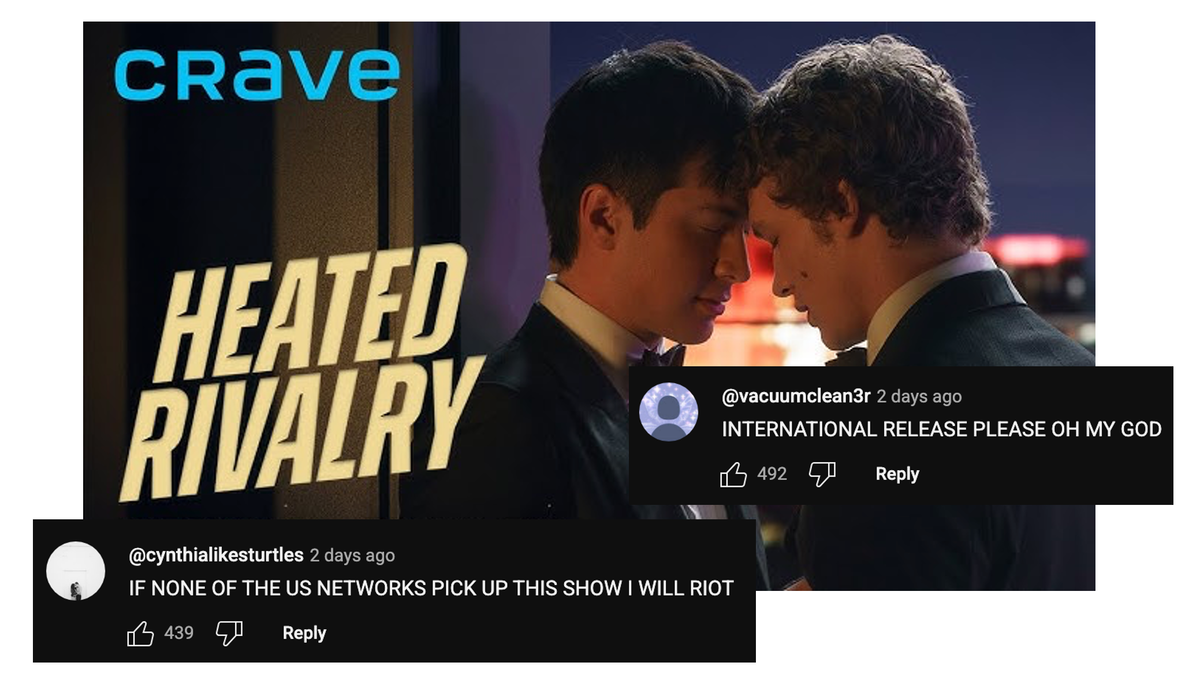
Week-to-Week is the weekly-ish newsletter of Episodic Medium written by me, Myles McNutt, about television and the larger media industries. To receive future newsletters and learn more about what we cover weekly for paid subscribers (including our reviews of Heated Rivalry), sign up today.
The release of a trailer is a crucial point in a show’s promotional life. Teaser images or posters could be valuable, but in our social media age a trailer is vital content, able to be shared into social feeds alongside posts from friends or family. They might live on YouTube in their purest form, but they’re also imagined as expanding to every social network to be shared and commented on.
Last week saw new trailers for a wide range of upcoming series, including both November’s Pluribus from Apple TV+ (which Donna Bowman will be covering for us) and HBO’s A Knight of the Seven Kingdoms, which I’ll be tackling when it debuts January 18.
The latter example is relying on the social reach of its predecessor, with the official Game of Thrones accounts sharing the adaptation of George R.R. Martin’s Tales of Dunk and Egg novellas alongside HBO and its global licensing partners, which includes Canadian streaming service Crave.
Given that the show is a spinoff of one of the most successful shows of all time, you might expect that Crave’s 63k Instagram followers would engage with this content, but their post featuring the trailer managed only 192 likes in its first 48 hours on the platform. This wouldn’t be so strange for a trailer for a new show, honestly, except that another trailer for a new series posted on Crave’s account the same day had over 9000, and counting.
The only problem? A large percentage of those likes are from people who aren’t even sure they’ll be able to watch the show in question legally.
Eventually, I’ll have plenty of thoughts about November’s Heated Rivalry as a gay hockey romance TV show, and specifically as an adaptation of a gay hockey romance novel (with a lot of explicit sex), but in the short term the most pressing part of this story is the fact that it is a Canadian gay hockey romance TV show (with, based on this trailer, a lot of explicit sex).
Given my country’s feelings about hockey, this origin for the enemies-to-lovers story of Shane Hollander and Ilya Rozanov shouldn’t be surprising, but it has proven vexing for the fans of Rachel Reid’s novel outside of the country who are being teased with a TV show that only has Canadian distribution. Currently, the team behind Heated Rivalry are at MIPCOM—a conference dedicated to the sale of global TV content—working to change that, pitching their (almost) finished series to platforms beyond the Great White North.
This situation has created what strikes me as unprecedented discourse among fans of Reid’s books. I cannot think of an example of a foreign series—Canadian or otherwise—which has lived in this liminal space of proximity and distance to a fanbase before, with every comment section full of "Hollanov" fans pleading for distribution in their own country or region. While fans have long lobbied streaming services to save a canceled show using Netflix and other services’ “request” features, I can’t recall a case where such a campaign focused on U.S. rights to a foreign series (no doubt helped by the fact it’s in English). And while it’s possible I’ve missed other examples of these phenomena before, I am confident that no fan group has ever actively discussed their actions in relation to MIPCOM, positioning their advocacy as a boost for meetings the show’s owners will take this week.
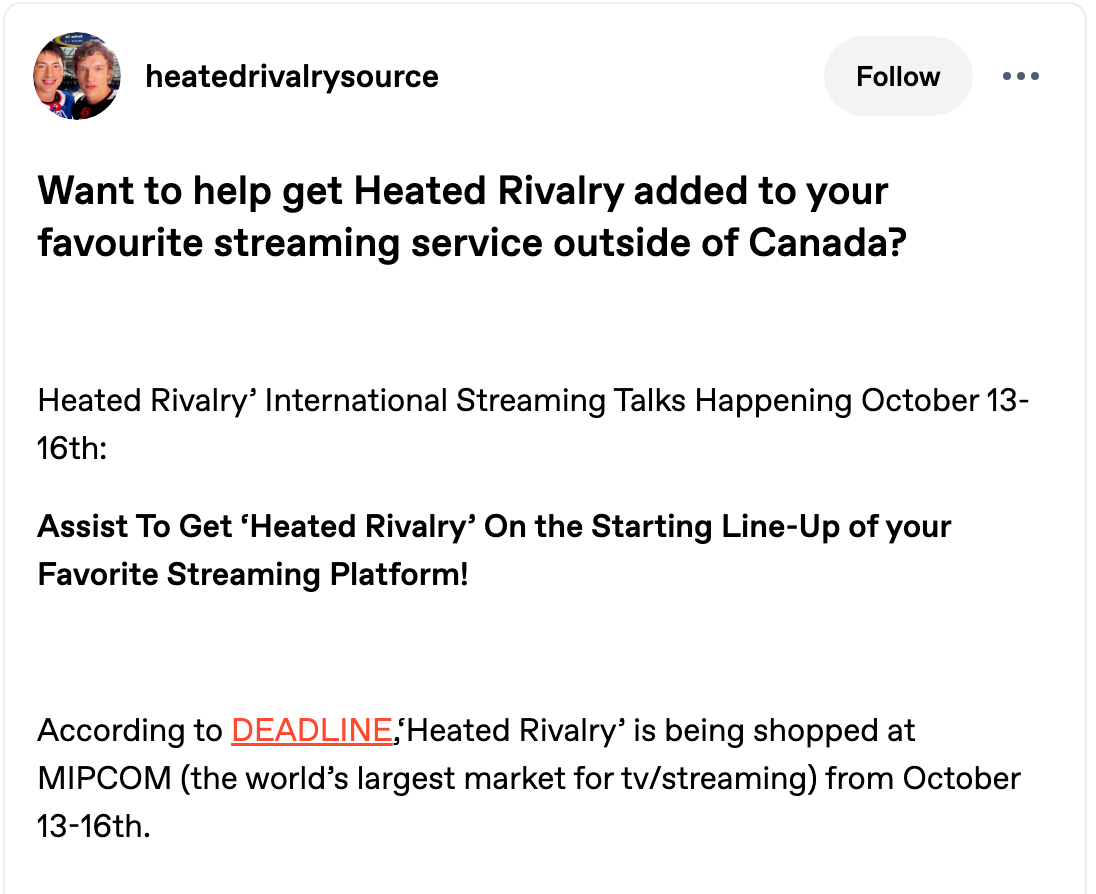
To be clear, I am not surprised by the passion and engagement of Reid’s audience: in our age of BookTok, social reading is a vital source of online community, and this is particularly true in the case of romance readers who have long faced delegitimation in broader discourse. Combined with the cross-section of MM (male-male) romance and hockey romance, and the periodic accessibility of Reid’s books on the Kindle Unlimited platform, in many ways Heated Rivalry exists for the same I.P.-related reasons that HBO is making A Knight of the Seven Kingdoms. And when I spoke with writer-director Jacob Tierney and producer Brendan Brady (who worked together on Letterkenny and Shoresy) from Accent-Aigu Entertainment, they acknowledged they sold it to Crave on these bona fides.
What might seem more surprising to an outside observer is that a show drawing this kind of engagement from a dedicated audience didn’t translate those bona fides into global distribution sooner. I reached out to Tierney and Brady before their trip to MIPCOM because I wanted to tell the story of how they got to this moment, where they are meeting representatives of streaming services armed with comments from desperate fans anxious about how they’re going to watch this show.
It’s a story that both reinforces and challenges the norms of Canadian television, all operating alongside the goal of challenging the norms for romance and queer content more broadly.
Every semester, I talk to my American students about Canadian content regulation, and I always start by asking them how many people they think live in Canada. It’s an enjoyable exercise to see how well they understand their neighbors to their north, but it’s also a way to demonstrate just how much smaller a “market” it represents. American TV shows are a threat to Canadian sovereignty because they have the budgets afforded a show with a built-in audience of 340 million people, which are just naturally going to have a competitive advantage over shows being built for an audience of 40 million.
For this reason, Canadian shows have historically tried to expand their potential through a culture of co-production, working with U.S. or global distributors during the development of a show in order to gain access to additional funding. The idea is that while a Canadian show relying solely on Canadian funding might struggle to match a U.S. show in terms of budget or scale, bringing on partners from other markets helps create a product closer in line with, for example, the HBO shows that Heated Rivalry will appear alongside in Crave’s lineup. This is the system that gave us some of the Canadian shows Americans are most likely to have seen, like Orphan Black (although that one was extra complicated) and Schitt's Creek. It's not the only way Canadian shows get made, but it's the model that offers the most resources for Canadian producers to work with.
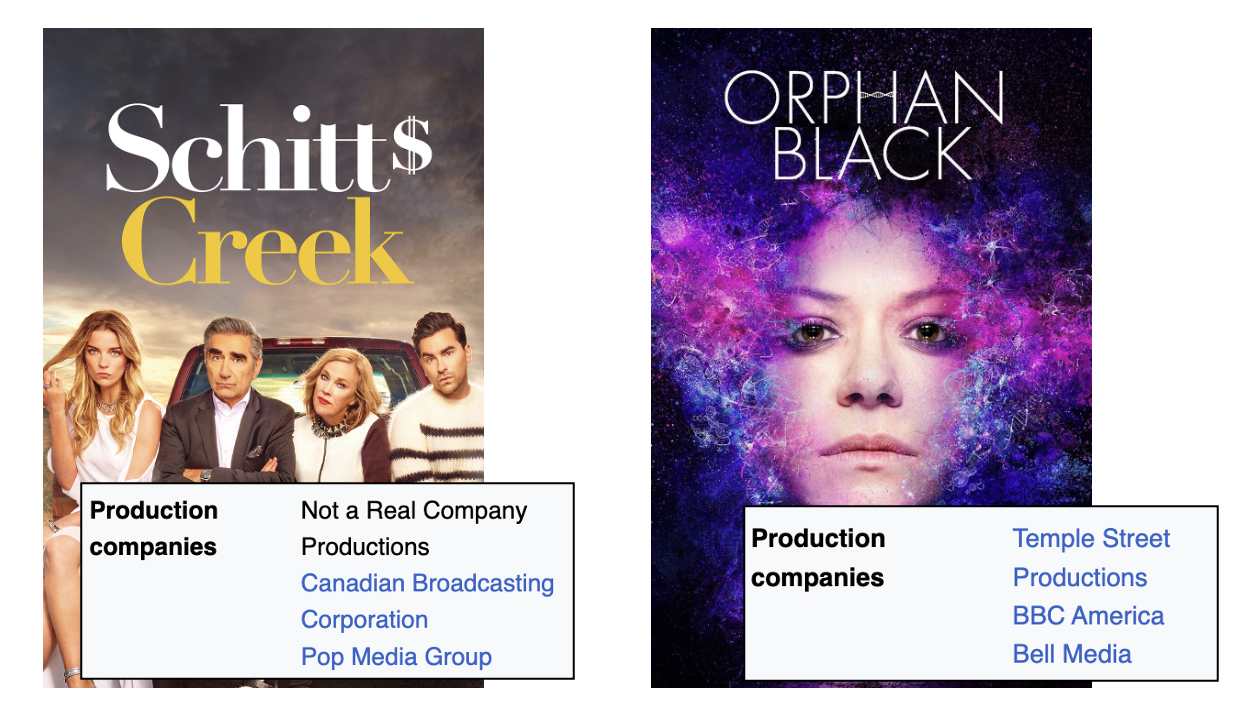
As I expected, Tierney and Brady did participate in this process once Crave (the streaming service owned by Canadian conglomerate Bell Media) initially picked up the show based on the former’s spec script, but their experience reinforces the compromises involved with piecemeal financing. In truth, my presumption going into our conversation was that those compromises would be related to the sex: as Tierney notes, the rise of queer romance adaptations has been linked to Young Adult examples like Heartstopper, but “the thing that is so fundamentally different in Heated Rivalry is sex. And so I was like ‘okay, will anyone want this with that?’ And the thing that was very obvious to me is that they were inseparable. Sex is character development; it’s not just a random sex scene in every episode. They learn about each other and they learn about themselves through this.”
Tierney wrote the script on spec in part because he didn’t think that they could get executives to read Reid's book and understand this, which turned out to be false: Brady confirms that “everybody read this book” as they were trying to sell it. However, while they credit Crave head of development Rachel Goldstein-Couto for embracing the book as it was—both as a queer open-door romance and as distinctly Canadian I.P.—this wasn’t necessarily going to be the case when looking at additional production partners. While Brady emphasizes that “we had talked with a number of third-party financiers and studios that we liked and would love to work with,” Tierney says that when looking for money from elsewhere “we received various notes that would fundamentally change the story, or fundamentally change the tone, and we were very lucky to have this executive backstop being like ‘no, you’re not doing that.’”
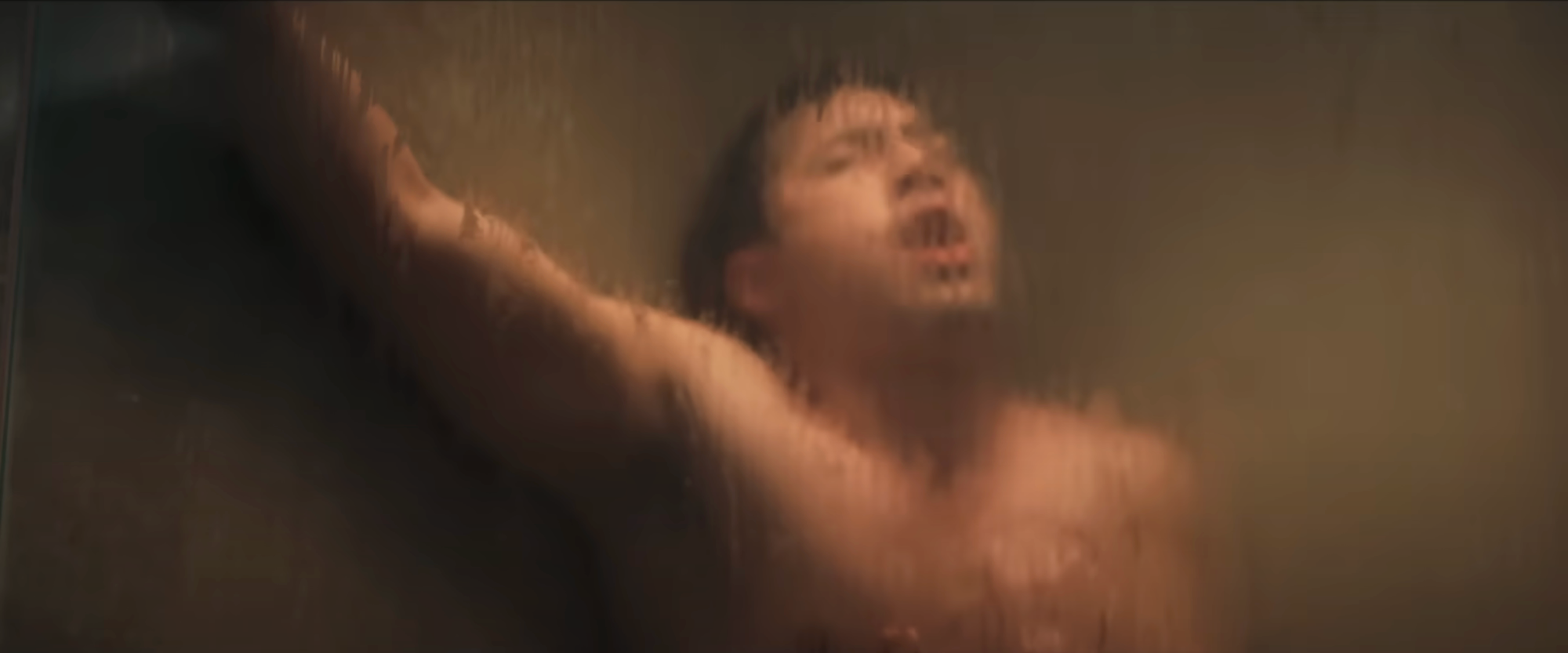
Brady frames this as a fundamental challenge of the global TV marketplace: “there are trends dictating how larger corporations feel projects should go, and then there are the realities of what Canadian budgets—and international television in general—can actually afford. And those two things are diametrically opposed most of the time.” To sell the show to those partners, Brady believes it would have become “some larger, grander thing that would not have been able to sustain itself for what we were trying to make it at." It also would have meant slowing down the development process, and “if you take your foot off the gas pedal while you’re in this critical moment of trying to get into production because somebody says ‘develop it more, or do this, or change this,’” Brady notes, “you will end up not making the show you want to make, or making a show at all.”
However, the financial realities of Canadian TV still meant that the license fee being offered by Bell, combined with tax credits, would not be enough to fund the show’s budget—this money did have to come from somewhere, and in this Brady concludes “the lessons we should learn from Heated Rivalry are not that this is how you should make a TV show. The lesson we learned is that we were incredibly lucky.” A fortuitous corporate development in March—a month before the show entered production—gave them an opportunity to address the shortfall without compromising the adaptation: Crave parent company Bell Media acquired a majority stake of U.K.-based distributor Sphere Abacus, with a focus on expanding the company’s reach in global markets. In order to help build the company’s offerings, Sphere Abacus were willing to contribute to the production, ensuring that Crave’s support for Tierney’s vision could remain intact. Brady notes that this gave them the structure they needed to deliver the show they knew the books deserved: “we would not have made the show at the level we were able to if we had had other people involved, because Jacob and I were willing to put it all on the line, and we just know big corporations would not have been able to do that.”
Now, though, those big corporations are being sold a produced series, made the way Tierney and Brady imagined it, and which fans have been responding to with great enthusiasm. Crave has been leveraging these efforts, sharing fan comments as part of their promotion leading up to the release of the trailer. Tierney credits the show’s buzz to their decision to bring author Rachel Reid into the process early: “it’s about Rachel reaching these people, her being into it, her communicating to her base who follow her rabidly that she’s happy about this, and that all that things that could go sideways with this are not going sideways.” (For instance, at a book event in Montreal over the weekend, she did a scene-by-scene breakdown of the trailer). Brady says the reaction to the first-look photos and the show’s trailer “are proving what we already knew, which is these fans are going to be the reason why this show breaks through. They are the core audience that is going to help drive a larger audience to this project.”
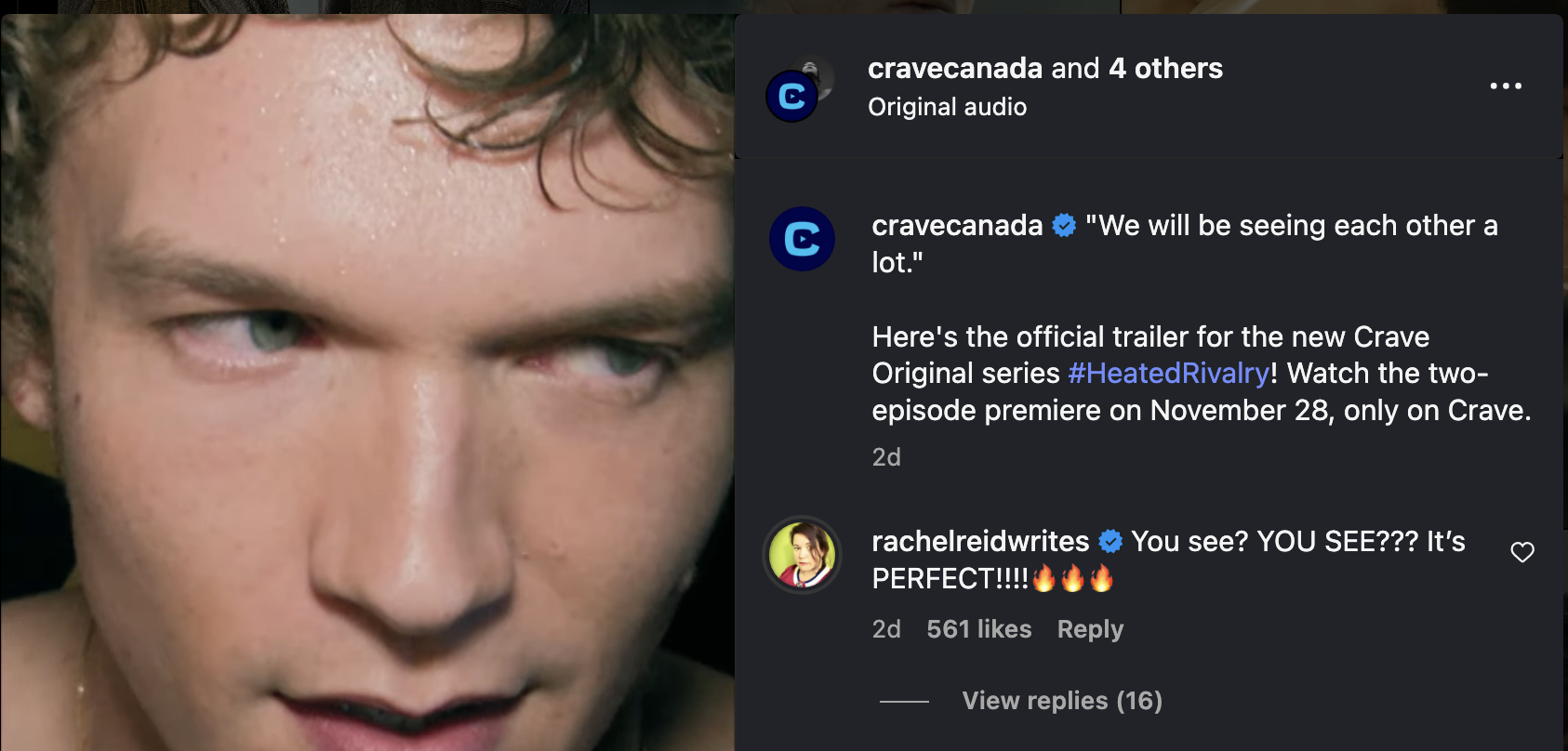
But first, the majority of them need to ensure they’ll have a way to see it. Fans on Reddit, Tumblr, and Instagram have been actively organizing to contact streamers to pick up the series, with some even tying those efforts to the sales process at MIPCOM thanks to Deadline’s trade reporting. While romance fans’ literacy about television financing and distribution is still nascent, their efforts are focused, structured around unofficial fan accounts that popped up on both Instagram (there's two!) and Tumblr after the show was announced. None of these accounts have grown to massive scale: Reid herself only has 15k subscribers on Instagram. But there’s an evangelism that comes with romance readers, and this is particularly true for an audience who never imagined their queer hockey books would be adapted at all, let alone with enough reverence that fans can match up moments in the trailer to passages from the books.
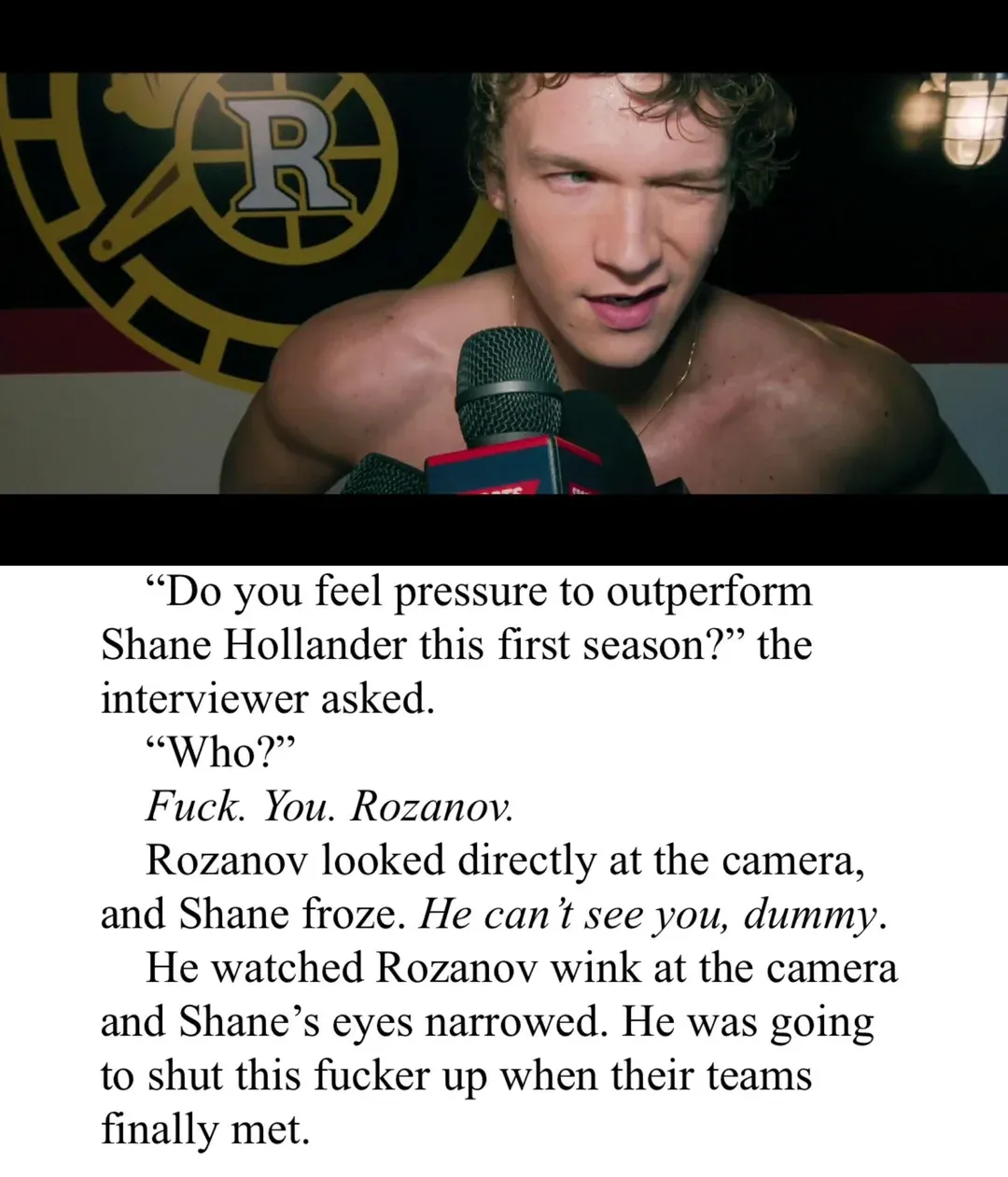
What remains uncertain is what kind of impact this will have when dollars meet cents. Brady admits it’s unlikely that the fan support for the show will be “the only reason we sell to somebody,” but “for our little project that could, it is going to be a helpful additive that may be the reason somebody says ‘Oh yeah, we are actually going to take a chance on this.’” When we spoke late last week, there were over half a million views of the trailer across platforms, and that number has only grown since. It’s hard not to see that as a somewhat unprecedented asset for a Canadian series being sold in the open market, a clear sign of the kind of fandom that will only grow as Reid’s characters gain a wider audience, and that audience discovers Shane and Ilya’s story is only one part of a larger universe (including a direct sequel and a separate romance that overlaps with it).
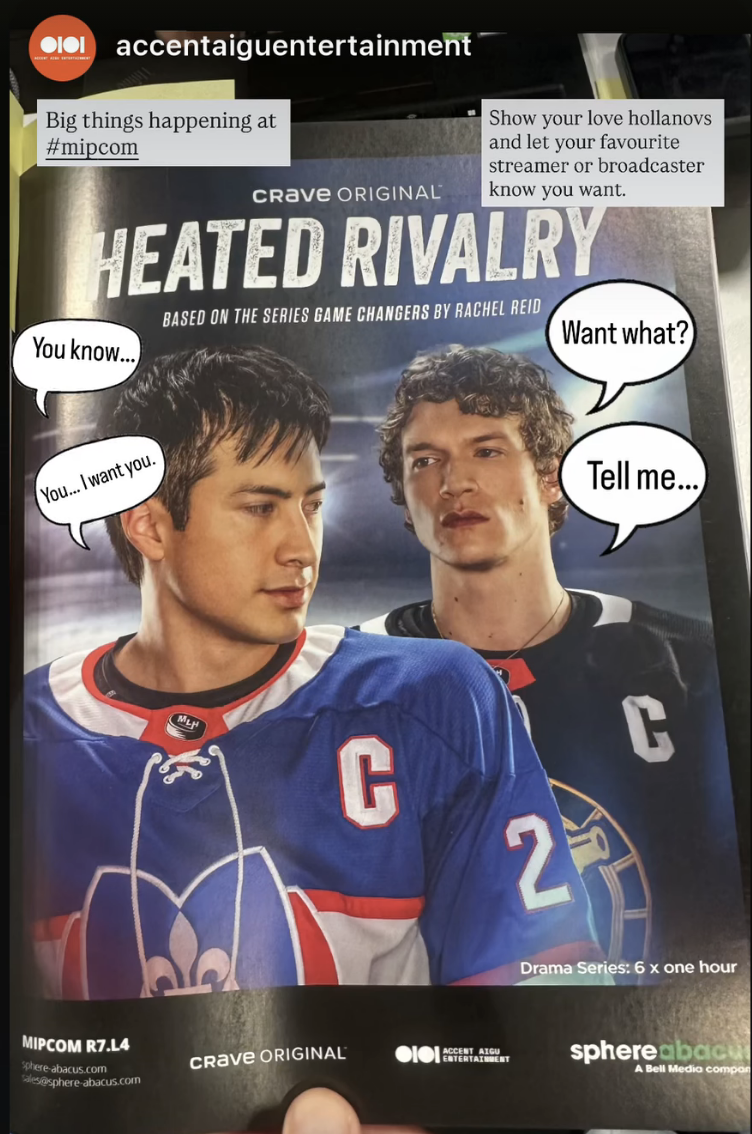
As they entered meetings at MIPCOM, Tierney and Brady told me they were “in the business of wanting to make this into a multiple-season series with Shane and Ilya’s storyline continuing on,” and the proof of concept for this is twofold: the show they’re selling and the unprecedented community emerging around it. The future of both will be determined in the days ahead, where all parties hope that those outside of Canada will get to be a part of the story.
Episodic Observations
- Like I said, I have more to dig into about the very idea of adapting Heated Rivalry within the context of prestige television, and we’ll explore that more once the show is closer to airing. In the meantime, if you want to join in the fun, Rachel Reid’s whole Game Changers series is an extremely satisfying journey of interconnected (and yes, extremely horny) narratives. You can just start with Heated Rivalry (the second book in the series) if you want, but based on the presence of its protagonist in this trailer, they're including at least some of the first book Game Changer within this season.
- Speaking of queer dramas, I caught some of Netflix’s Boots in the midst of grading, and I thought it was…fine. It’s interesting to see them repositioning a memoir to tell a different story more closely in relation to the beginning of “Don’t Ask, Don’t Tell,” and to see them effectively setting up a possible season two following these characters.
- Apple TV+ was kind enough to host a TCA press conference for The Last Frontier, which meant that I had it on in the background over the course of the past few weeks. I don’t know that I’d say it’s “worth it” in the sense that the “plane full of federal inmates crash lands in Alaska plus massive conspiracy" narrative hangs together fully, but it’s got some procedural elements to make (too-long) episodes have some structure, and it’s worth a gander if you’re looking for some junk food with a bit more of a serialized sheen to it. (Also, the remix of “Classical Gas” they’re using for the theme song goes harder than it needs to).
- As far as HBO comedies that weren’t scheduled when I set the fall lineup for Episodic Medium, I consider it more likely that Rachel Sennott’s I Love LA will make a significant cultural contribution, but this doesn’t mean that The Chair Company can’t come into its own. I’m admittedly not a connoisseur of Tim Robinson’s oeuvre, but I sampled this one last night, and it was definitely intriguing. It strikes me, though, as a show where the premise is slow-rolling to the point that critics who could binge probably have a better grasp on the show's tone than someone sampling one episode.
- As a reminder, if you want to discuss shows we aren’t covering, the best place is our Episodic Medium Discord exclusively for our Loyal Viewer tier. You can find out more on our About page.
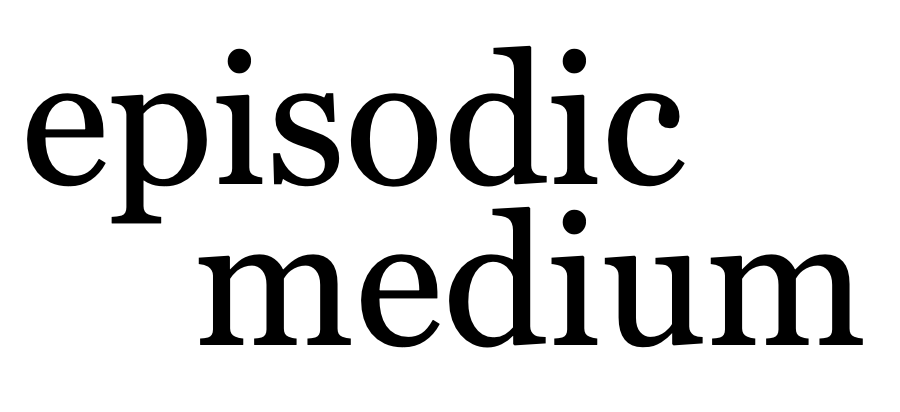
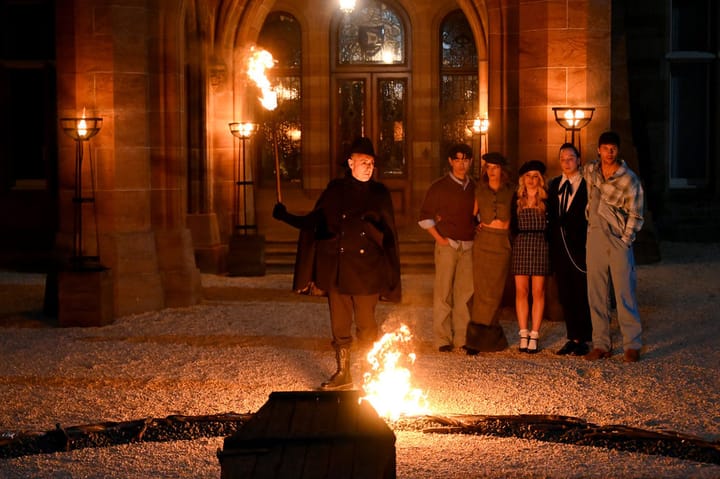
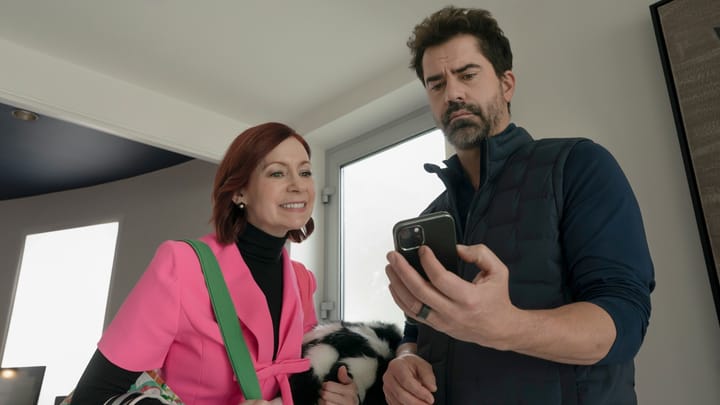
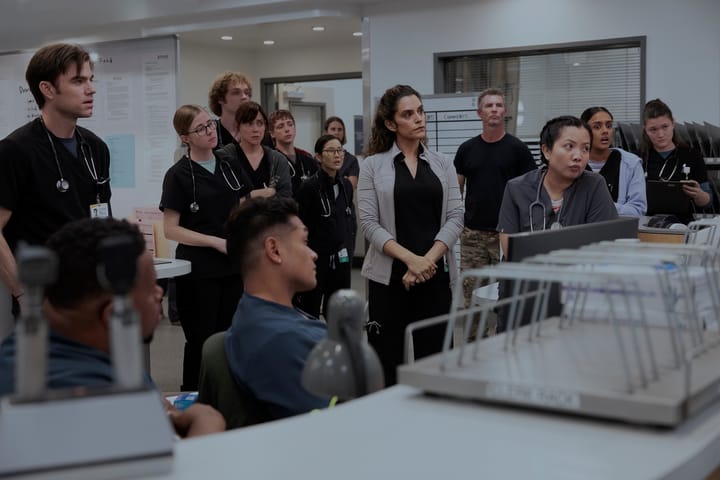
Comments ()